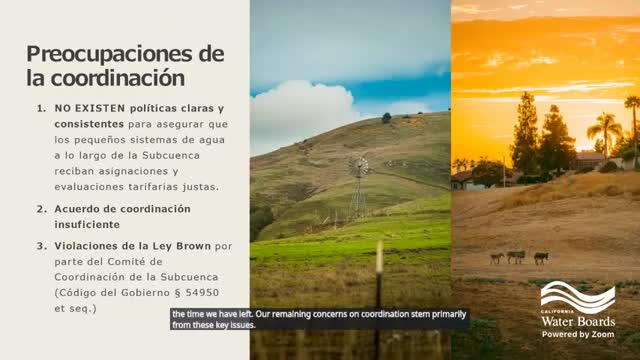Kern County Residents Demand Equitable Water Management and Mitigation Measures
September 17, 2025 | State Water Resources Control Board, Boards and Commissions, Executive, California
This article was created by AI summarizing key points discussed. AI makes mistakes, so for full details and context, please refer to the video of the full meeting. Please report any errors so we can fix them. Report an error »

In a pivotal meeting held on September 17, 2025, the State Water Resources Control Board addressed pressing concerns regarding water management in California's Kern County Subbasin. As the sun dipped below the horizon, illuminating the faces of concerned stakeholders, the atmosphere was charged with urgency and determination.
The discussions revealed significant gaps in the current water management policies, particularly affecting small water systems. Stakeholders voiced their frustrations over the lack of a clear and consistent policy that would ensure fair allocation and fee assessments for these communities. Many expressed that without proactive engagement from their Groundwater Sustainability Agencies (GSAs), residents would remain in the dark about their water situations until directly approached.
A critical point raised was the perceived inadequacy of the Coordination Agreement, which many believe fails to represent the needs of small communities adequately. This sentiment was echoed by concerns regarding the subbasin coordination committee's compliance with the Brown Act, which mandates transparency and public access in governmental meetings. Stakeholders argued that the current structure does not allow for equitable representation in decision-making processes.
The meeting also highlighted the ongoing issues surrounding well mitigation plans. While improvements have been acknowledged, there are still significant concerns regarding the criteria for mitigation related to water quality. Stakeholders argued that wells showing evidence of degradation after January 1, 2015, should be eligible for mitigation funding, countering the current stance that excludes them based on prior conditions.
Community engagement emerged as a recurring theme, with many emphasizing the need for effective outreach to address residents' fears about water safety. The board members recognized that groundwater quality was the top concern among Kern residents, and they stressed the importance of early mitigation efforts to prevent future crises.
As the meeting drew to a close, the call for probationary measures was clear. Stakeholders insisted that such steps are essential for achieving sustainability under the Sustainable Groundwater Management Act (SGMA) and for upholding the human right to water. The urgency of the discussions underscored a collective commitment to proactive measures, ensuring that no community is left behind in the quest for safe and sustainable water resources.
With the stakes high and the clock ticking, the board members left the meeting with a renewed sense of purpose, ready to tackle the challenges ahead in California's water management landscape.
The discussions revealed significant gaps in the current water management policies, particularly affecting small water systems. Stakeholders voiced their frustrations over the lack of a clear and consistent policy that would ensure fair allocation and fee assessments for these communities. Many expressed that without proactive engagement from their Groundwater Sustainability Agencies (GSAs), residents would remain in the dark about their water situations until directly approached.
A critical point raised was the perceived inadequacy of the Coordination Agreement, which many believe fails to represent the needs of small communities adequately. This sentiment was echoed by concerns regarding the subbasin coordination committee's compliance with the Brown Act, which mandates transparency and public access in governmental meetings. Stakeholders argued that the current structure does not allow for equitable representation in decision-making processes.
The meeting also highlighted the ongoing issues surrounding well mitigation plans. While improvements have been acknowledged, there are still significant concerns regarding the criteria for mitigation related to water quality. Stakeholders argued that wells showing evidence of degradation after January 1, 2015, should be eligible for mitigation funding, countering the current stance that excludes them based on prior conditions.
Community engagement emerged as a recurring theme, with many emphasizing the need for effective outreach to address residents' fears about water safety. The board members recognized that groundwater quality was the top concern among Kern residents, and they stressed the importance of early mitigation efforts to prevent future crises.
As the meeting drew to a close, the call for probationary measures was clear. Stakeholders insisted that such steps are essential for achieving sustainability under the Sustainable Groundwater Management Act (SGMA) and for upholding the human right to water. The urgency of the discussions underscored a collective commitment to proactive measures, ensuring that no community is left behind in the quest for safe and sustainable water resources.
With the stakes high and the clock ticking, the board members left the meeting with a renewed sense of purpose, ready to tackle the challenges ahead in California's water management landscape.
View full meeting
This article is based on a recent meeting—watch the full video and explore the complete transcript for deeper insights into the discussion.
View full meeting
